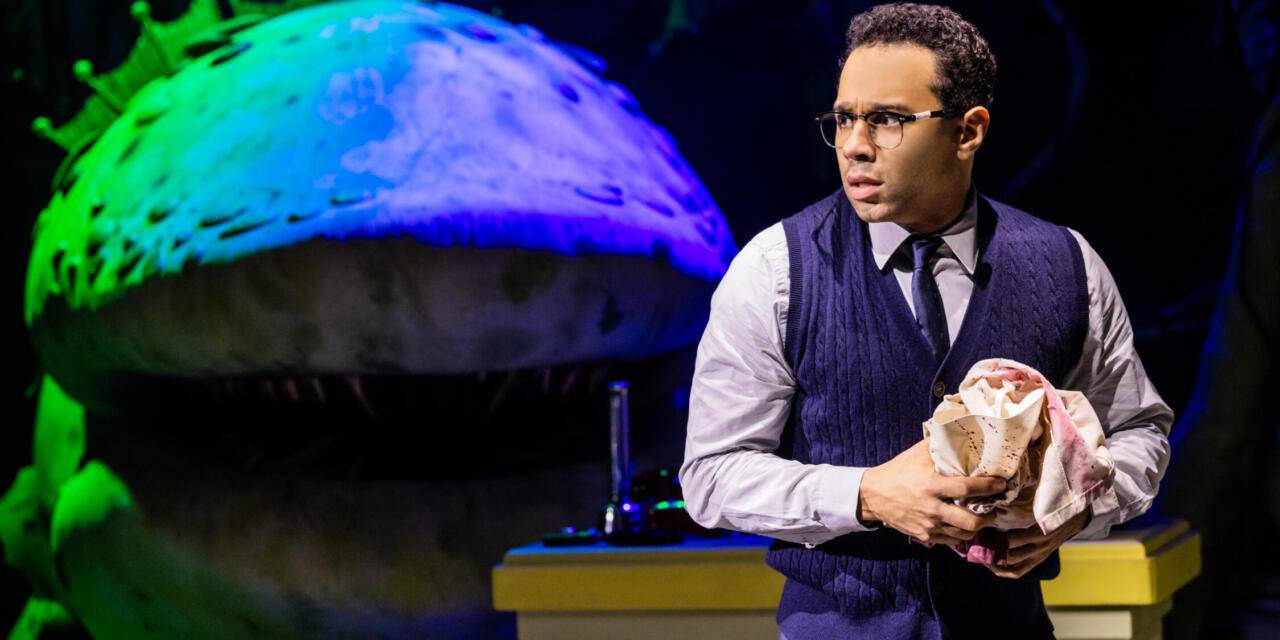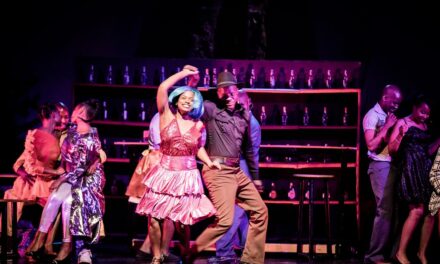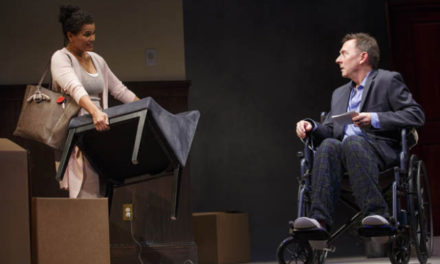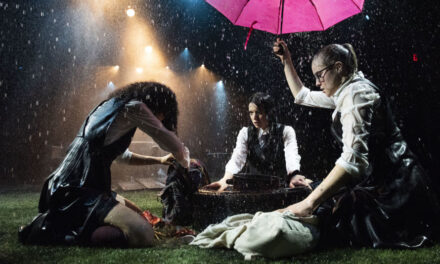Little Shop of Horrors is a famous rock musical by Alan Menken, with the book and lyrics written by Howard Ashman, based on the horror comedy film directed by Roger Corman (1960) – and in 2022 the Little Shop celebrated its 40th anniversary. Over such a long period the show became extremely popular due to its long post-premiere run (over five years), multiple national tours across the US and the UK, revivals (2004, 2007, 2009, 2019), as well as new productions in Canada and Australia. The 1986 screen version directed by Frank Oz also helped make this show a hit, even though originally, many thought the movie to be “unsuccessful.” At present, the new feature film remake is in the works – directed by Greg Berlanti, with a screenplay by Matthew Robinson. The legendary musical is currently running Off-Broadway at the Westside Theatre in New York, directed by Michael Mayer. Corbin Bleu is currently playing the leading role of Seymour. Corbin kindly agreed to a short interview where he shared his experience performing such an iconic role.
LM: I came to see the Little Shop of Horrors several weeks ago and I was completely blown away by your performance. I loved your Seymour! Little Shop of Horrors is such a legendary show. We’ve all seen it, it’s one of the greatest musical theatre pieces out there and you had a very difficult part to play in it.
CB: Thank you! And I love that you got to come and see the show.
LM: It was an absolute pleasure. Now, I remember you as Chad from High School Musical and those two characters couldn’t be more different. I witnessed such a huge transformation! How did you do it? How did you create your character of Seymour?
CB: It’s funny, the last several theatre productions and Broadway shows that I’ve done have all been within the realm of Golden Age musical theatre, very “MGM, Gene Kelly-Fred Astaire,” very charming… and the characters that I’ve played have all been very confident men. Seymour is a character that I don’t usually get to play. Although I’ve wanted to play Seymour for a very long time. I’ve always been a fan of the show, and, of course, the movie, since childhood. I remember seeing the movie for the first time as a kid – I’ve always been into the “weird,” anything Tim Burton, Rocky Horror Picture Show blew my mind when I first saw it too, and still, till this day, I would love to do that show sometime! Little Shop of Horrors has always been on my radar but again, it’s not usually the character that I get to play and as the opportunity came about, I was beyond excited.
“Little Shop of Horrors” – Corbin Bleu as Seymour/ Photo Credit by Evan Zimmerman
As for Seymour – I think what’s so important to remember about him is just that he is the root of the show. Everyone else around him is wild: you have the dentist, you have Mushnik, the Urchins just fall in and out depending on what the moment calls for, and even Audrey is larger than life. I think that if you don’t find the heart and the humanness to Seymour, by the time you get to the end when everybody dies, you don’t necessarily feel for him, you don’t feel it pull on your heartstrings. And I think I wanted to make sure that everything is happening to him and he’s not the one necessarily influencing anything: he just makes wrong choices throughout. The physicality of Seymour was also something to play with and interesting to explore. I wanted to find that lack of confidence that he has – I’m very hunched… It’s funny because I tend to do a lot of big dance shows and going into this I was thinking: “Oh great, I get to save my knees!” I thought physically it was not going to be as much as what I usually do. But because of the physicality of Seymour, I’m just as achy as ever when the show is over… From the way I stood throughout the two hours of the show.
LM: This is very different from how you carry yourself in everyday life!
CB: For sure!
LM: I know that you’ve seen the movie and were you inspired by Rick Moranis who played the role in the movie?
CB: Yes, absolutely. He was one of the biggest influences for my Seymour. I’ve seen a couple of other productions of the show but because I grew up with the movie, Rick’s portrayal has always been the quintessential Seymour for me. I think I pulled a lot from him.
LM: But you also made Seymour your own, I have to say. Which very much inspired me when I saw you as Seymour on stage. It’s difficult to play characters like that, the ones that we’re all used to, the ones we’ve seen before, created by such amazing actors as Rick Moranis, in this case. But when you make the character your own and do an amazing job at it – that is fantastic!
CB: I very much appreciate that you saw it in my performance. Thank you. As an actor, you have your influences, and you do your best to have a full “fleshed-out” character, but ultimately you need to find the bridges between who this character from your imagination is and who you are as a person. Find those two and connect them.
LM: It is a small cast, which is unusual for the musicals on Broadway and Off-Broadway. We are used to musicals having a huge ensemble. But you have a rather small cast, how is it working with your co-stars?
CB: They are all fantastic. It is a very small cast and I think that Little Shop of Horrors works very well in general in such an intimate setting. The original Off-Broadway production had the opportunity to move to Broadway and Howard Ashman said that he wanted to preserve the intimacy of what that show had and even its original influence – the 1960 movie – is very camp, low-budget and there’s something to “the cheese and the camp” that comes along with it. When you have a much larger cast and a much larger house – even the shock of what you’re seeing doesn’t hit you as hard. In our case, the spectator feels like they’re really there, a fly on the wall – where one can witness this little undoing of the lives happening in front of the audience. It is not much of a spectacle, really. And the cast has been wonderful to work with. It’s tiny but mighty. You get to know everybody very well. And this is my second time working with Bryce Pinkham [Orin and others], we did Holiday Inn together. So, it’s fun to get to see him again. And working with Constance [Constance Wu] is wonderful. I think that she is such a consummate professional and every day up there on stage she’s always connected with me.
LM: I could tell. I think you were a wonderful couple with her. She was very different from the Audrey that we’re used to. But you two balanced each other out perfectly.
CB: Thank you. I think what’s also so great about this show is that it does let people have their own interpretations. The text and the music – we all know it, it is legendary, such a perfect musical – but we also have the opportunity to deviate and have our own interpretations. Even within this production, we’ve had so many iterations, it’s been a revolving door of actors coming in to play all of the iconic roles. I think I’m the seventh or eighth Seymour now to come into this production. Each one has been very different.
LM: As you said, that’s the interesting thing about this musical specifically: everybody can create their own characters and make them different. There are so many musicals out there where you hear from actors that when they joined the cast, they had to imitate what the previous performer did in certain instances and, kind of, follow in their footsteps. But this show allows creative freedom for actors.
CB: There are choices that my predecessor Jeremy Jordan had made – I didn’t see any of the other Seymours before him, so I wasn’t sure what choices were specifically Jeremy’s and what were made for the production. While I was in rehearsals, I got to ask those questions and so much of it was open to me being able to turn it into my own interpretation and put my own stamp on it. And I’m very grateful for that.
LM: I see that you like playing Seymour and love him as a character. But if you had to choose again – who is your favorite character in the Little Shop of Horrors if not Seymour? Is there another role that you’d love to play?
CB: Yes. I think Orin is such a fantastic character – what Bryce [Bryce Pinkham] is doing with him is brilliant. He is so creative and wild! Working with him on stage every day – I have moments when I must temper myself as far as not laughing. I think what makes his Orin work so well is that he has leaned into the drug addiction side of Orin, his need for the gas, and it makes him so tweaky and unpredictable and because of that, you feel like he is extremely unhinged, and would be very violent. I would love to play Orin someday – it would be so different from what I’m playing now. I love diving into different characters. And then Audrey II is such a fun and incredible character and Aaron [Aaron Arnell Harrington] – is so consistent in what he’s doing with the voice of the plant. Again, I feel like he plays such a wonderful homage to the original film version and yet he still has his own stamp on it.
LM: Everybody dreams of playing Orin – the dentist, but also Audrey II! Such a specific character. I’ve heard of Audrey II’s being played by women…
CB: Our understudy for Audrey II is a woman! I’ve had the opportunity to go on with her before and it is a very different feeling, but it still works for the show in its own way. I think that when you hear the male voice, and it’s deep and grunting – that deep baritone sound can feel very intimidating whereas Zakiya Baptiste, who is the understudy –sounds more like a kid who is burning ants with a magnifying glass.
LM: Wow!
CB: It sounds more youthful but it’s still very disturbing. A very different take on the character.
LM: That made me very curious – I want to see another version of Audrey II. Now, what is your take on this show? Why do you think such a “vintage” show is so popular today? There were so many adaptations, stage and film directors kept reviving the show, bringing it back to the stage for us to see over and over again. Why do you think the musical is so popular?
CB: There are so many elements to it. Alan Menken and Howard Ashman – the pair of them and the work that they created, the music is absolutely beautiful, the story, the text is there. You have all of these wacky characters that are intriguing, the show is very economical in terms of how quickly you move through it. It’s two hours with intermission. The show just flies by, and every scene has a purpose. It doesn’t feel like there are any fillers, it moves along well. I think we are all drawn to the weird intrigue when it comes to the gore or the horror. And seeing all these people get chopped up and fed to a giant man-eating plant – the puppetry… There are so many elements to this show that are fascinating and special. And it makes sense why it had its cult following for so many years.
LM: You bring a giant human-eating plant onto the stage and there you have it! There were many adaptations of the show on stage and film versions, do you believe this story is meant more for being on stage or being on film?
CB: I think there is a space for it in both mediums. It has gone back and forth between the adaptations. It started off as a film and then it was turned into a stage production and that was turned back into a film. I also really love how different the film from the 80’s and the original film were – how the two films have different endings. The fact that the characters end up alive, and the stage version is truly a tragedy whereas the film isn’t.
LM: What kind of ending do you like more for this story?
CB: I like each of them for their particular medium. I am obsessed with the movie; I usually watch it every year. I think when it comes to the film – I like being able to have the film go out on that positive note with the little, tiny Audrey II hanging out in front of the camera at the very end. For the stage production, I think that it ends up being so much more of a cautionary tale and I think that feeling the live performance and seeing this downward spiral that occurs in front of your own very eyes, always makes you wonder: “What would you do?”
LM: What is the secret message of this musical? There is a belief out there that this is a story about class struggle and the downside of neglecting moral principles and values – I think that it is a little too far-fetched. But there is truth to it. What do you think is the main message of this story?
CB: Class struggle is apparent in the show, we start off on Skid Row and we have these characters who, in different circumstances, I think, would have had a very loving relationship, and would thrive, but they’ve just been born into these lives, these environments, that have caused each of them to think that they’re not worthy of a loving relationship and that’s why Audrey subjects herself to the abuse of Orin and why Seymour subjects himself to the abuse of Mushnik. And once they get to a point where fame and fortune are thrust upon them – they find that they actually can be together. But when they finally come to that realization in Suddenly Seymour – where we actually see them together, it’s almost immediately taken away when Mushnik comes and says that he knows that Seymour murdered Orin. And that causes Seymour to go ahead and murder Mushnik. Again, he makes a horrible choice guided by his wish to desperately hold on to the love that he now has. He even asks Audrey: “Would you still like me if I was just a nobody?” And she says – “I would still love you,” but at that point, it is too late. And they’re not able to reverse all the damage that he’s done. So, it is very tragic, but I think so much of the story is about how important it is to know your self-worth! Everyone is deserving of a loving relationship; you shouldn’t think of yourself in that lonely kind of way.
LM: Indeed. Very well said. What is your favorite song from the show?
CB: Probably Feed Me!
LM: I was hoping you would say that.
CB: Yes. It’s just incredible – the plant doesn’t talk until the second half of Act One; you go through so much of the show before the plant even makes a sound. And when the plant finally talks, it just propels the show onto a whole new level and that number is just such a rocking number.
LM: So, what does the line “feed me” mean to you?
CB: (laughs) Well, if you’re looking at it literally… I think again it’s about “What would you do -” if you’re feeding the machine, feeding the void, feeding whatever is that entity, the genie that says he’ll grant you the three wishes – he’ll give you fame and fortune if you only feed him. Would you do it? Would you feed the monster to achieve your wildest dreams?
LM: But that monster is so cute, I have to say! How did you build that relationship with the plant throughout the show for Seymour?
CB: I’ve always wanted to work with puppets. Just last year I was saying how I wanted to get into a show where I get to work with puppets, and this is such a perfect introduction to it. Not only do I get to play against our amazing puppeteers who have the puppetry in Feed Me and the massive puppet in Act Two. But during You Never Know I get to puppet the second pod myself. And it’s so perfect because I don’t have to lip-sync with the puppet, it’s solely just actions. Not speaking. That’s a whole other element of puppeteering. I wasn’t just completely thrown into the deep end. I feel like the song had such a perfect construction. And for me – I am a dancer, and I feel like the movements of the puppeteering have come very naturally to me, just because I look at it as choreography.
LM: That’s the song where you are crossing the stage with a puppet, carrying the plant?
CB: Yes. The song is called You Never Know. And the plant is snapping at the audience and we’re doing a little dance on stage.
LM: That was fun to watch. I saw you at your second show…
CB: Was it a Wednesday matinee? Yes, that was my second show. Those first few shows are just like being shot out of a cannon. When I think of those first few shows and now that I’m entering my fourth week – it’s extremely different. By now I’ve found so many more nuances to Seymour and my comfort level with the puppets is different. Seymour is a much denser role than I even gave it credit for. In terms of the sheer amount of dialogue and lyrics. And there’s a lot of patter-singing, where verses are very similar, and you have three in a row, and you just have to know exactly which crazy sentence you’re stringing together within that verse within a very short amount of time. So, those first few shows you’re just hoping to say the right thing. And now I feel like I get to play and explore out there.
LM: You did a fantastic job! I know that in theatre, actors believe that the second show is the toughest one. “Just survive the second show…” Maybe because during the first show – there’s so much adrenaline and during the second you calm down a bit?
CB: Yes, I guess so. It’s always different with replacing, because whenever the whole cast as a group is starting the show anew – everyone has that feeling of “Oh my God, this is it! Here we go!” And when you’re on stage – you’re looking into each other’s eyes: “Oh my, we’re doing this!” But when you’re replacing – that’s not the case. Everyone else has been doing show after show after show and they’re all very comfortable already and you’re just doing your best to fall in line and mold into what they’ve already got going on. I felt like the first show for me was the most chaotic. Then, during the second show, it felt better! I do know what you’re saying though. I’ve gone into projects when the entire cast is creating a show from scratch and that second show after the adrenaline rush of the first show – yeah, it can be a trap.
LM: When you join the show, do you prefer being a part of an “all-new” cast where you all create the show together or being the “fresh actor,” who joins the cast that had done the show previously?
CB: If I had to choose – I’d say starting from scratch with the whole cast just because you do get to build the show in rehearsals with each other, you know what’s going on. Whereas when you are replacing – you must find those rhythms while you’re doing the shows. During rehearsal you’re working with the stage manager, you might have a few understudies come in and you just get your one put in: to do one show without the audience and with the cast and then you’re on. It is a very stressful process. I think the benefit of replacing is that the work has been done and you get to go and watch the show while you’re in rehearsals. I rehearse during the day and then I go and watch the show at night, and I get to see what they’ve already built. I’ll take something, I’ll decide that I’ll choose to do something differently. So, there is a silver lining to that. But for a full process – I prefer building the entire show with the cast from scratch.
LM: That’s always a lot of fun. Was Constance Wu, currently playing Audrey, also starting out with you?
CB: Yes! And that was another silver lining to this process – that both of us started out together, so even though we were thrown into a cast that already had all of their rhythms set, she and I, both were new, and we were able to play off of each other and find our Audrey and Seymour during the rehearsal process. And we could lean on each other during those first several shows, trying to figure things out.
LM: That must have helped, and you were able to build your dynamic during the show. For how long are you staying with the show?
CB: I’m here till the end of January.
LM: Do you have any other shows coming up after the Little Shop of Horrors?
CB: Not right this second.
LM: Do you like performing in musicals for the most part or in dramatic plays too?
CB: Both! I’ve always been such a musical theatre lover, but as an actor, I appreciate getting to do all things.
LM: Out of all the musicals out there – which musical would you love to perform in? And what characters would you still like to play if you haven’t played them already?
CB: Rocky Horror Picture Show is out there for me; I would love to play Frank-n-Furter. The Wild Party is one of my favorites – I would love to play Burrs in that one… It suits my voice, and it would be a fun character. Who knows, maybe one day…. As for the next thing – I would love to do something new. I love new works!
LM: Hopefully we’ll see you in other musicals on Broadway soon!
Wishing the Little Shop of Horrors many years of success ahead, and many more productions by professional and amateur theatres. The moral of the musical is simple and true – never sell your soul to the Devil – that won’t bring you happiness or make you rich. And remember, never get tricked into feeding the monster… Or simply – “Don’t feed the plants!”
This post was written by the author in their personal capacity.The opinions expressed in this article are the author’s own and do not reflect the view of The Theatre Times, their staff or collaborators.
This post was written by Lisa Monde.
The views expressed here belong to the author and do not necessarily reflect our views and opinions.


















